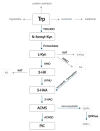Tryptophan Metabolism via Kynurenine Pathway: Role in Solid Organ Transplantation
- PMID: 33671985
- PMCID: PMC7919278
- DOI: 10.3390/ijms22041921
Tryptophan Metabolism via Kynurenine Pathway: Role in Solid Organ Transplantation
Abstract
Solid organ transplantation is a gold standard treatment for patients suffering from an end-stage organ disease. Patient and graft survival have vastly improved during the last couple of decades; however, the field of transplantation still encounters several unique challenges, such as a shortage of transplantable organs and increasing pool of extended criteria donor (ECD) organs, which are extremely prone to ischemia-reperfusion injury (IRI), risk of graft rejection and challenges in immune regulation. Moreover, accurate and specific biomarkers, which can timely predict allograft dysfunction and/or rejection, are lacking. The essential amino acid tryptophan and, especially, its metabolites via the kynurenine pathway has been widely studied as a contributor and a therapeutic target in various diseases, such as neuropsychiatric, autoimmune disorders, allergies, infections and malignancies. The tryptophan-kynurenine pathway has also gained interest in solid organ transplantation and a variety of experimental studies investigating its role both in IRI and immune regulation after allograft implantation was first published. In this review, the current evidence regarding the role of tryptophan and its metabolites in solid organ transplantation is presented, giving insights into molecular mechanisms and into therapeutic and diagnostic/prognostic possibilities.
Keywords: indoleamine-2,3-dioxygenase; ischemia-reperfusion; kynurenine; rejection; tolerance; transplantation; tryptophan.
Conflict of interest statement
The authors declare no conflict of interest.
Figures


References
-
- Annual Reports. [(accessed on 29 November 2020)]; Available online: https://www.eurotransplant.org/statistics/annual-report/
-
- Organ Specific Reports. [(accessed on 29 November 2020)]; Available online: https://statistics-and-reports/organ-specific-reports/
-
- Jochmans I., Brat A., Davies L., Hofker H.S., van de Leemkolk F.E.M., Leuvenink H.G.D., Knight S.R., Pirenne J., Ploeg R.J. COMPARE Trial Collaboration and Consortium for Organ Preservation in Europe (COPE). Oxygenated versus Standard Cold Perfusion Preservation in Kidney Transplantation (COMPARE): A Randomised, Double-Blind, Paired, Phase 3 Trial. Lancet. 2020;396:1653–1662. doi: 10.1016/S0140-6736(20)32411-9. - DOI - PubMed
Publication types
MeSH terms
Substances
LinkOut - more resources
Full Text Sources
Other Literature Sources
Medical

